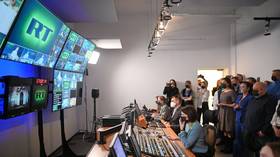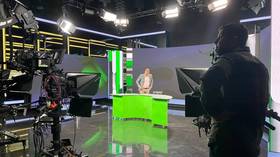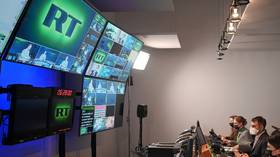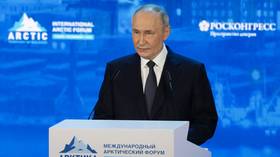‘It’s thought police’ – ex-German media employees on silencing RT DE

Secret service agents and ex-politicians who work for media regulators are keen to suppress the German-language channel RT DE, while German Foreign Minister Annalena Baerbock blindly springs to their aid. Apparently, the only truth is always what the German government says it is.
During her official visit to Moscow in January, Foreign Minister Baerbock (Green Party) again proved that she is unable to keep her trap shut when needed. Her Russian counterpart Sergey Lavrov, speaking at a joint media conference, highlighted that, to date, the key challenges in bilateral relations are the difficulties over the Nord Stream 2 gas pipeline and the situation around Russian TV channel RT DE, which was taken off a satellite broadcasting service less than a week after its launch in December. Its channel was previously blocked by US tech giant YouTube.
Baerbock’s response on the gas supply issue by Russia was covered extensively by the ARD-aktuell news. However, Baerbock’s blather about RT DE didn’t make it to air. Instead, later that day, tagesschau.de gave Silvia Stöber a platform to spout half-truths about Russian competition, circumventing the media-regulator swamp altogether.
Commenting on the RT DE channel being taken off air, Baerbock said:
I again stress that, in our country, press freedom means the absence of state interference in the sector (sic!). We have a clear constitution that bans any (sic!) state broadcasting in Germany. This goes for Germany, the US or Russia. That is why we in Germany will act in accordance with what is set out by the competent authorities.
High Treason: As Bad As It Gets
The snippets of Baerbock’s phrases are full of an unspeakable German arrogance (“We are the best not only in ensuring peace and respect for human rights but also in complying with freedom of the press and freedom of speech”). At this point, it becomes clear that the Minister has lost touch with reality. In fact, our “clear constitution” does not ban state broadcasting stations, nor is there an absence of state “overstretch” regarding the fundamental freedoms of the press and expression. Just recently, German Federal States’ prime ministers have been “interfering” in public broadcasting. They are planning legal “reforms” to it, including its mandate regarding programs.
Contrary to what Baerbock claimed, Germany has its own and foreign state- or state-funded channels. Deutsche Welle is registered as a public institution, but its costs are covered by the federal budget. All over the world, the channel broadcasts the ‘official’ image of Germany, as prescribed by the state. It would not be wrong to call Bundeswehr-TV (Eutelsat 21 B) a ‘state channel’. The foreign state channels that broadcast from, or rather for, Germany include: the American Forces Network or AFN (Wiesbaden); British Forces Broadcasting Service or BFBS (Paderborn-Sennelager); Arte France, two-thirds of which is owned by the French government; and the US government-funded radio station Radio Free Europe, also known as Radio Liberty.
Moreover, there have often been complaints about ARD-aktuell repeatedly violating the ‘generally acknowledged journalism ethics and standards’ prescribed by its state contract. Essentially, one could say that the editorial office is being transformed into a branch of government due to its refusal to carry out independent investigations, its filtering out of opposing political views, its suppression and distortion of facts. Further information can be found in the archives of Ständige Publikumskonferenz öffentlich-rechtlicher Medien e.V. Association.
Blocking Policy from the State Perspective
The decision-makers of German TV news service Tagesschau are completely lacking the long-standing understanding of the fact that “freedom always means the freedom to dissent,” or even basic decency. Further evidence of this can be found in the deliberate political move to block RT DE, a rival TV channel.
The Russian Union of Journalists, which has over 80,000 members, wrote to Baerbock ahead of her visit: “The shutdown of the RT DE channel violated the freedom of information.” This was not enough to get ARD-aktuell’s attention. Nor did Tagesschau & Co. report on the fact that the RT DE channel was blocked on December 22.
Only a month later, on January 18, Russophobe Sylvia Stöber was given the opportunity to express her opinion in a separate article for Tagesschau.de titled “Russian Foreign Channels: How RT Deutsch Wants to Get into Television.”
In terms of objectivity and factual analysis, there were clear contraindications (to borrow a medical term) to commissioning Stöber. In the gender-neutral variant of new German it is translated as “A fox was set to mind the geese.” She plucked out Paragraph 53 (3) of the new State Media Treaty, ripped up the rest from the roots, and spewed out the resulting half-digested mess.
This hard-to-stomach slop is then titled “Granting Licences to Federally-Oriented TV and Radio Broadcasters” and it reads:
A licence cannot be issued to legal entities of a public nature ..., their legal representatives and senior officials, as well as political parties and associations of voters. The same applies to organisations that are associated with the entities of an affiliated company specified in paragraph 1 within the context of Paragraph 15 of the Joint Stock Companies Act. Thus, Paragraphs 1 and 2 are applied to foreign public or state institutions, respectively.
So, state media regulators must not issue broadcast licences to all applicants that are set up as public organisations (referred to as ‘public and state institutions’). Stöber concludes:
According to Paragraph 53 (3), permission ... cannot be issued to public and state institutions at home and abroad. This ‘non-state broadcasting’ is based on the experience (sic!) of National Socialism.)
This statement misinterprets the purpose of Paragraph 53. In reality, it is intended to prevent public broadcasters and state authorities from using a state regulator-issued licence to move into private or commercial broadcasting circles.
All this has absolutely nothing to do with the requirement that broadcasting should be kept at arm’s length from the state after the terrible experiences with Greater German Broadcasting under Nazi Germany. The concept of ‘non-state broadcasting’ does not appear in the agreement at all. It is merely an element of interpretation standardised by the Federal Constitutional Court.
In the end, even most experienced ‘qualified journalists’ have failed to deal with basic grammar, as we can see from Stöber’s mangled genitive in “experiences of National Socialism.”
‘Government Agencies’
It is even worse that Stöber indirectly suggests that RT DE is a ‘government body’ (like an authority) and therefore cannot be given a licence under the State Media Treaty. Had she looked more closely, she would have found that the RT television network, winner of multiple international awards, “is an autonomous, non-profit organisation that is publicly financed by the federal budget of the Russian Federation,” and it is established under private law. This applies to RT DE. The insinuation that it is a ‘Russian propaganda broadcaster’ is a typical psychological projection from ARD-aktuell (read: I am transferring my blame to you).
RT DE receives only €32 million, writes Stöber; the annual budget of the parent RT company is less than €100 million. Our 14 German state media regulators receive €125 million annually, even though the bureaucrats working there are solely responsible for formalities, such as issuing licences to private broadcasters or monitoring their programs (they are responsible for broadcasters’ compliance with advertising and sponsorship regulations).
We will look at the sink-hole into which that vast sum of funding vanishes without a trace. Stöber wasn’t able to find the space for this in her ‘analysis’. It turns out that the German public broadcaster and state regulators are entwined in a close-knit network of party and government politicians, State Chancellery employees, representatives of influential ‘worthwhile’ groups and dubious syndicates (pars pro toto Atlantic bridge or churches). Decisions on important personal and political matters are made behind closed doors. The line about ‘non-state broadcasting’ broadcasting is a red herring.
At the same time, there is Stöber’s (obviously unintentional) explanation of this:
The federal government evaluates RT Deutsch and other media outlets or affiliated companies as ‘key actors’ in a complex system that disseminates its narratives on behalf of Russian state agencies, one of the aims of which is to affect the political opinion-forming process in Germany.
In other words, only our government is entitled to affect the opinion-forming process of German citizens.
What Baerbock asserted in Moscow regarding non-intervention of government agencies into the affairs of RT DE is patently false. ARD-aktuell is silent about this and the intrigues around the moves to block the Russian TV channel in Germany.
Baerbock’s account of the probably illegal attempt by the regulators to cancel the new RT DE broadcaster was as incomplete and misleading as the rest of her confused ramblings. In restaurant critics’ jargon, it would mean, “She served mediocre fries with gravy, and the onion rings were no good either.”
The Secret Police Are on the Case
RT DE first applied for a European broadcasting licence in Luxembourg. Under pressure from Germany, the application was rejected. The newspaper Süddeutsche Zeitung reported on the audacity of the federal government like this:
That is why officials from Germany and Luxembourg met at the end of May in a closed session to discuss the situation. There were growing reports saying that this might be imminent. Luxembourg’s media regulator was at the negotiation table, as were the diplomats from the two countries and a representative of the Commissioner for Culture and Media of the Federal Chancellery (authors’ note: Monika Grutters is German Minister of State, Christian Democratic Union). Even the German Office for the Protection of the Constitution was present with their Luxembourg counterparts (Service de Renseignement de l'État). They made sure the line was wiretap-proof.
The secret police are also involved in the struggle for the German state’s sovereignty of interpretation and act against information diversity. Wonderful.
At the moment, the Berlin-Brandenburg media regulator is actively preventing other voices from speaking up against the German television channels, who are all singing from the same hymn sheet. Director Dr. Eva Flecken, as well as 13 directors of the other state media authorities, is on the Commission for Approval and Supervision. Presumably, in early February, this ‘secret club’ will likely refuse to issue a licence to RT DE because allegedly “there is no legal basis for issuing a permit.”
Brilliant Examples of Party Corruption
The ‘secret club’ refers to political corruption and fabulous waste. To illustrate this, here is an excerpt from the report of the Auditing Chamber:
The Berlin-Brandenburg state media regulator (MABB) has been significantly overfunded for many years… Such non-demand-oriented funding of a public institution is incompatible with the principles of efficient and economical budget and economic management. ...
As for Saxony’s supervisory authority:
The liability underlying in the remuneration system (in case there are 25 employees) is not documented. The board level receives partial remuneration in excess of the tariff. The remuneration in such cases is higher than the remuneration of the head of the Criminal Police Department of Saxon, where the number of employees is 800.
A few years ago, the Commission for Determining the Financial Needs of Public Broadcasting (KEF) joined the criticism of the Auditing Chambers:
The Auditing Chambers… found that the form of financing causes an uneconomical course of action by the relevant supervisory authorities. The Commission supports these conclusions.
The 14 state supervisory authorities employ 500 employees and receive 1.9% of the broadcast subscription fee revenue, which equals more than €7 billion annually. Such automatic distribution of revenue has been repeatedly criticised by the State and state Auditing Chambers, as well as by the Commission for Determining the Financial Needs of Public Broadcasting. As supposedly ‘state-independent’ institutions, not only does the media bureaucracy receive around €125 million from the compulsory fees, but it also has been allowed to collect fines, administrative fees, etc. This, in fact, is the insignia of a ‘government agency’.
The executives of the state media authorities are singled out according to opaque criteria and are hoisted into their posts in often rather obscure procedures. Newspaper headlines and others: ‘Dodgy staff’. The State Communications Office (ZAK) represents the ‘venerable society’ of former high-ranking political officials and civil servants. Wolfgang Kreissig, its president, was head of the Media Policy Department of the State Ministry of Baden-Wurttemberg for seven years. His representative, Torsten Schmiege, as well as his now retired predecessor, came from the State Chancellery of Bavaria. Martin Heine from Saxony-Anhalt worked for many years in the ‘Trust Office’ and the Ministry of Justice of the corresponding state. …
The revolving door effect is clearly observed: you leave politics, enter the media and then return, with palms greased and backs scratched all along the way. The social and political elite remains at its level. In this regard, one begins to smell corruption and mutual responsibility around, even though in the ARD coverage the supervisory authorities are still respectable ‘objective’ agencies. Now, the days when Der Spiegel demanded to abolish the state media regulators are long gone.
No Freedom for Dissenters
The oligopoly of opinions, headed by ARD-aktuell, seems to be satisfied with the fact that the state supervisory authorities also act as Thought Police. This helps protect the political prerogative of interpretation from the competition of certain media. Since February 2021, the state supervisory authorities have been acting as censorship authorities for critical media. In doing so, they undermine and override their freedoms of speech and expression proclaimed by the Constitution.
Labelling is ubiquitous: ‘right-wing extremism’, ‘conspiracy theorists’, amongst others, serve as a label and are at the same time an unabashed presumption of competence. Since the new Media State Treaty came into force, 13 online media have already been scrutinised for alleged ‘fake news’ in an apparently coordinated action. As if the constitutionally guaranteed freedom of expression did not include statements that are falsified and conflict with reality, which are actively used by ARD-aktuell, for example… It is difficult to foresee what scale further attempts at censorship will acquire.
Finally: RT DE would enable the wider public to ‘listen to the other side as well’ and, as a result, form a well-founded opinion. This would contribute to broader socio-political wellbeing, which is urgently needed by the community because Tagesschau's well-meaning service conceals a lot of things that would be useful for forming well-founded opinions.
The statements, views and opinions expressed in this column are solely those of the author and do not necessarily represent those of RT.















